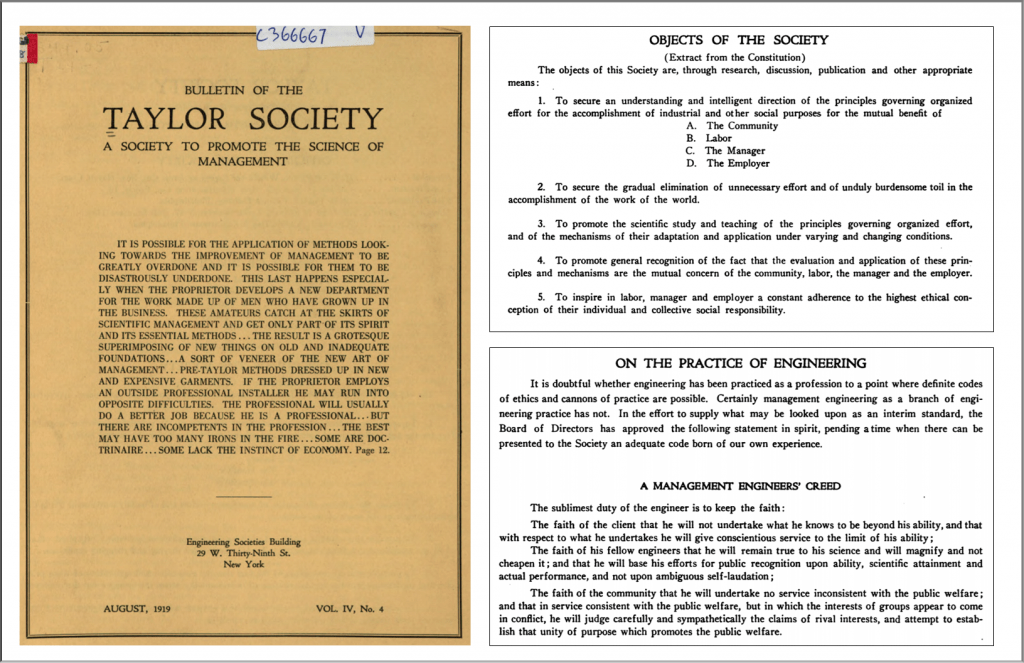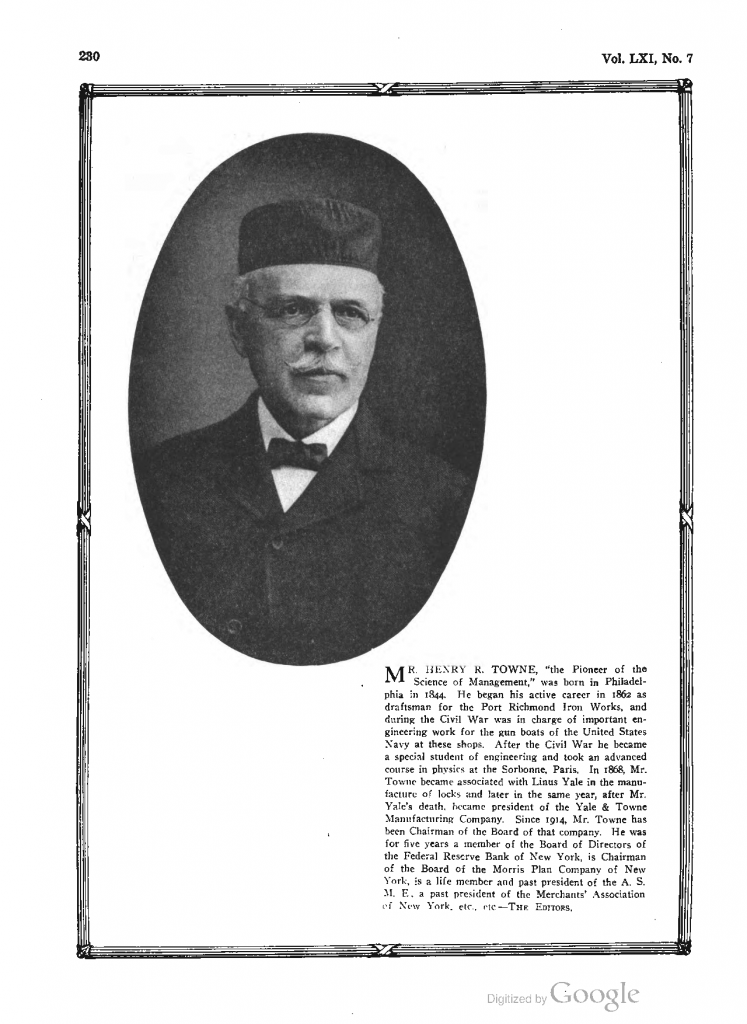…very helpful when it comes to learning from history to better understand the present.
One of my great interests is to read books and papers from the early days of industrial engineering and its transformation into progressive management. This time period, circa 1890-1935, interests me because Scientific Management was the foundation for TPS and the Toyota Way, and its derivative Lean management. Additionally, the Scientific Management movement experienced many of the same difficulties that we face today.
I offer you a curated collection of my recent readings from between 1911 and 1921. Anyone interested in Toyota’s production system, The Toyota Way, or Lean — whether service or manufacturing — should be very interested in these articles. One of the things that you will quickly realize is that Scientific Management circa 1912 is better aligned with TPS/Toyota Way than Lean was when it was introduced to the public in 1988 and for nearly two decades thereafter.
You will be amazed by what you read in the articles below. And you will quickly realize that those who created Scientific Management were intelligent, deeply thoughtful people, with good intentions, who dedicated their lives to improving industry, the practice of management, and workers’ lives. Their innovations were a critically important and necessary step in the advancement of progressive management. Frederick Winslow Taylor et al. are not the horrible villains that self-proclaimed “management expert” James P. Womack makes them out to be. (Click here for my rebuttal to Dr. Womack’s article).
The reading is assembled chronologically into a single 53-page .pdf file (click here to view or download) and includes the following 10 articles:
- “The Problem of Industrial Efficiency,” Henry Gantt, The Engineering Digest, March 1911, pp. 179-183
- “Elementary Time Study as a Part of the Taylor System of Scientific Management,” H.K. Hathaway, Industrial Engineering and The Engineering Digest, Vol. XI, No. 2, February 1912, pp. 85-95
- “A Little Faking on Both Sides,” Anon., Bulletin of the Efficiency Society, Vol. 1, No. 2, December 1912, pp. 10-11
- “The Efficiency Movement: An Outline,” Charles B. Going, Journal Efficiency Society, Transactions Volume 1 (1912), 1913, pp. 11-20
- “The General Principles of Organization Applied to an Individual Manufacturing Establishment,” Henry R. Towne, Journal Efficiency Society, Transactions Volume 1 (1912), 1913, pp. 77-83
- “Training for Large Responsibilities in Business,” James P. Munroe, Journal Efficiency Society, Transactions Volume 1 (1912), 1913, pp. 399-405
- “Inefficient Efficiency Experts,” Anon., Bulletin of the Efficiency Society, Vol. 2, No. 4, April 1913, pp. 8-9
- “A Few Words on the Subject of Getting Things Done,” Henry Gantt, Journal of the Efficiency Society, Volume 2, No. 6, June 1913, pp. 8-9
- “Making Goods Versus Making Records,” Henry Gantt, Efficiency Society Journal, Vol. 6, No. 9, September 1917, pp. 460-461
- “Training Men to Specialize in Cutting Costs,” Edward L. Ryerson Jr., Factory: The Magazine of Management, 1 March 1921, pp. 590-594
Enjoy this small sampling of great work that was the foundation upon which Toyota’s management system was built! And please don’t ever forget that it was the birth of industrial engineering that led to the Toyota Production System and The Toyota Way, while it was MIT researchers that gave birth to “Lean production.“
Are you interested to learn more? Then read these truly impressive works:
- “The Spirit and Social Significance of Scientific Management,” Morris Cooke (The Journal of Political Economy, Vol. 21, No. 6, June 1913), 13 pages
- “The Men Who Succeed in Scientific Management,” H.K. Hathaway (pages 46-54), in A Symposium on Scientific Management and Efficiency in College Education, (The Papers Presented at the Efficiency Session of the Twelfth Annual Convention of the Society for the Promotion of Engineering Education, Boston, Mass., 26-29 June 1912), 1913
- Primer of Scientific Management, Frank Gilbreth (D. Van Nostrand Co., NY, NY, 1914), 103 pages.
- The Psychology of Management, Lillian Gilbreth, (Sturgis and Walton Co., NY, NY, 1914), 344 pages.
- The Theory and Practice of Scientific Management, Clarence Bertrand Thompson (Houghton Mifflin Company, NY, NY, 1917), 325 pages
- The Taylor System of Management: A Report, in Manual Form, on the Accomplishments of Scientific Management, Supplemented with a Discussion of How to Secure Some of the Most Important of these Accomplishments, Clarence Bertrand Thompson (A.W. Shaw Company, NY, NY, 1917), 215 pages
The first is a 13 page paper by Morris Cooke that gives you a great sense of the intent of Scientific Management, which is to benefit both owners and workers. Next is a powerful essay by Horace King Hathaway which every TPS/Lean practitioner can relate to. Finally, two powerful books by Frank and Dr. Lillian Gilbreth that get into amazing detail about Scientific Management from both technical and human perspectives. The works by Clarence Thompson are especially important because they survey Scientific Management as practiced in industry and highlight successes and failures. You will see, very clearly, that Toyota management is more closely aligned with Scientific Management than you ever imagined – and that Scientific Management is much closer to Toyota management than Lean is.
Still want to learn more. Then check out more original sources:
- The Principles of Scientific Management, Frederick Winslow Taylor, Harper and Brothers Publishers, 1911 (145 pages)
- “The Taylor and Other Systems of Shop Management: Testimony of Mr. Frederick Winslow Taylor,” Hearings Before Special Committee of the House of Representatives to Investigate the Taylor and Other Systems of Shop Management Under Authority of H. Res. 90, Volume 3, 25 January 1912, pp. 1377-1508
You will find Taylor’s testimony to the U.S. Congress to be especially interesting.
Want to know how it all started? Henry R. Towne (1844-1924), “the pioneer of the Science of Management,” whose early application of “Systematic Management” in the 1870s (see research by Joseph A. Litterer) at Yale & Towne Manufacturing Company, led to his calling for (in 1886) an engineering approach to management that later led to Scientific Management and Industrial Engineering. This is another piece of history worth knowing and to honor our forebears who had the vision to comprehend and begin the development of management as a science. Click on the image below to read a short paper by Henry Towne.
Postscript: In April 2021 I posted numerous articles and images on LinkedIn about the early days of Scientific Management to help educate Lean movement leaders, Lean practitioners, industrial engineers, managers, and others. The entire series of posts and articles are collected in a single pdf file. You can download it here (418 pages, 46MB).


